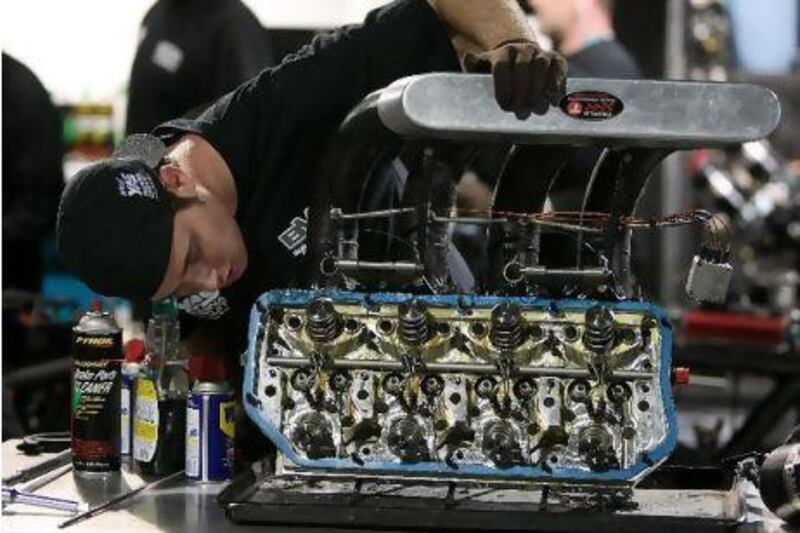Neil Vorano
Three point nine zero one seconds. That's how long "Hot" Rod Fuller took to finish his fastest run at the Yas Marina Drag Festival last Saturday in his Top Fuel dragster. Hardly seems enough to get out of bed for.
Mind you, it was 3.901 seconds of brutal fury, earth-shaking power and blinding speed; he clocked 507.81kph at the 1,000m mark, the highest speed ever recorded in the UAE and just 4kph slower than the world record for a drag car. It's possibly the most excitement you could possibly have in under four seconds.
But after each of Fuller's furious runs are over, it's time for the rest of his Yas Marina drag team to start their own race - that of stripping down and completely rebuilding the 8,000hp dragster's engine and clutch before the next run later that night.
The brutality of these V8 engines doesn't bode well for their durability; they're designed for short runs with immense horsepower, and that kind of stress means that parts won't last long. To stay competitive and avoid a catastrophic failure - quite possibly at more than 500kph - they must be rebuilt perfectly with all new parts. The thing is, it's got to be done in the time a normal mechanic would take to change the spark plugs on a Toyota Camry.
Rob Flynn is the man orchestrating what looks like mayhem in the pit after every race. He's the chief mechanic of the Yas Marina team, and has been with Fuller for four years, off and on, and for all of Fuller's wins in the US. He's been working on dragsters for more than 30 years and describes why the work has to be done.
"Each cylinder has to make around 1,000 horsepower, so it has to be perfect," he says. "You've got to make sure all the parts are alright.
"The clutch has to be rebuilt after every run to ensure consistency. It has to be the same with every run; you can make all sorts of adjustments, but you don't have a crystal ball to figure it out. And then, a lot of the other things are done as maintenance issues because there is so much stress on the parts; you don't want to lose a race over a $200 [Dh735] part.
"We do it here in an hour and a half, but when we race in the US, it has to be done in 75 minutes; sometimes even 60 minutes."
After the dragster reaches the pits, a team of six to eight mechanics swarm around the car, each with his own job. With air and power tools, they get to work dismantling the engine; the block stays in the car, but almost everything else, save the crankshaft and camshaft, is lifted out. Almost everything is replaced, whether it needs to be or not; some parts are kept for inspection and may be used later on, but there's no time to make sure with another race looming.
The parts are cleaned, oiled and replaced carefully. Despite the rush, everything has to be done perfectly - one small mistake will turn an 8,000hp engine into a bomb sitting behind the driver's head.
When the engine and clutch are back together, the fluids are filled and the car is fired up as a test. And though there's no chequered flag for this race, it's an unofficial honour and a matter of pride to be the first team finished.
"Oh, yeah, on race day, it's a big thing," says Flynn. "If you start your car to warm up before anyone else, it's a big psychological advantage. You know, maybe it doesn't mean anything, but if you're working and you hear the other guy start up, it works on you a little bit."
Though Flynn has been around the drag strip for more than three decades, he's never raced himself. But the task of building and maintaining a drag car is more than enough of a rush for him and his crew.
"It's always a challenge. You never make the perfect run, and if you win the race, you want to win the championship. You can't just win the race, you want to win all the races. It's competitive like any other sport, you want to be the best all the time.
"We all started doing it for fun; now it's how we make a living."











